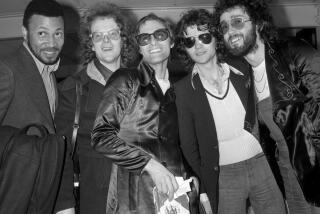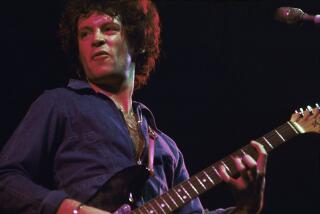Dobie Gray dies at 71; singer later became a songwriter



Notable music deaths of 2011 (Paul Hawthorne / Getty Images)


Notable deaths of 2010 (Wally Skalij / Los Angeles Times)

Notable sports deaths of 2011 (Harold Matosian / Associated Press)

Notable sports deaths of 2011 (AFP / Getty Image)

Notable sports deaths of 2011 (Diamond Images / Getty Images)

Notable film and television deaths of 2011 (Kevork Djansezian / Associated Press)

Notable deaths of 2010 (John Redman / Associated Press)

Notable deaths of 2010 (Louis Sahagun / Los Angeles Times)

Notable sports deaths of 2011 (Jonathan Ferrey / Getty Images)

Notable deaths of 2010 (Lawrence Lucier / Steinway & Sons via Getty Images)

Notable deaths of 2010 (Jim Dyson / Getty Images)

Notable deaths of 2010 (Mike Groll / Associated Press)

Notable deaths of 2010 (Michael Ochs Archives / Getty Images)

Notable deaths of 2010 (Bill Sikes / Associated Press)


Notable deaths of 2010 (Joe Brier / McClatchy-Tribune)

Notable deaths of 2010 (Liz O. Baylen / Los Angeles Times)

Notable deaths of 2010 (Wayne Risher / Associated Press)

Notable deaths of 2010 (Rick Bowmer / Associated Press)

Notable deaths of 2010 (John Gwillim / Associated Press)

Notable film and television deaths of 2010 (Bob Chamberlin / Los Angeles Times)

Notable deaths of 2010 (Rick Bowmer / Associated Press)

Notable deaths of 2010 (Stephan Agostini / AFP/Getty Images)

Notable deaths of 2010 (Robert Gauthier / Los Angeles Times)

Notable film and television deaths of 2011 (Nick Ut / Associated Press)

Notable deaths of 2010 (Anna Moore Butzner / Grand Rapids Press)

Notable deaths of 2010 (Christophe Ena / Associated Press)

Notable deaths of 2010 (Hillery Smith Garrison / Associated Press)

Notable deaths of 2010 (Mark Boster / Los Angeles Times)

Notable deaths of 2010 (Michael Ochs Archives / Getty Images)

Notable deaths of 2010 (Mustafa Quraishi / Associated Press)

Notable deaths of 2010 (Lawrence K. Ho / Los Angeles Times)

Notable deaths of 2010 (Karen Tapia-Andersen / Los Angeles Times)

Notable deaths of 2010 (Roald Berit / AFP/Getty Images)

Notable deaths of 2010 (Eddie Adams / Associated Press)

Notable deaths of 2010 (Charles Dharapak / Associated Press)

Notable deaths of 2010 (Alex Wong/Getty Images)

Notable deaths of 2010 (Karen Bleier, AFP/Getty Images)

Notable film and television deaths of 2010 (Dave Hogan / Getty Images)




Notable film and television deaths of 2010 (Bob Chamberlin / Los Angeles Times)
Dobie Gray, a smooth balladeer and soul singer who scored his biggest hit in the early 1970s with “Drift Away,” has died. He was 71.
Gray, who had cancer, died Tuesday at his Nashville home, said Charlie Andrews, his attorney.
Before he adopted the name of Dobie Gray — a nod to sitcom character Dobie Gillis — the singer recorded under other names before breaking through with 1965’s “The ‘In’ Crowd,” which became a top 20 hit. He also had success that year with “See You at the Go-Go.”
The silky-voiced tenor was best known for his progressive rock and soul version of “Drift Away,” a 1973 top 5 hit penned by Mentor Williams that includes the lyric, “I wanna get lost in your rock and roll and drift away.” It remains a staple of oldies radio.
A subsequent recording by Gray, “Loving Arms,” was frequently covered by singers from rock, country and R&B.
“I guess what you call my ‘signature songs’ will never die, thank God,” Gray told the Tennessean newspaper in 1988.
When Gray was featured on a 2003 version of “Drift Away” by rap artist Uncle Kracker, the song once again became a hit.
Gray “had such a unique style, so identifiable,” said Bud Reneau, his songwriting partner. “It was a big factor in his marketability.”
He was born July 26, 1940, in Simonton, Texas, into a family of sharecroppers. References list his given name as Leonard Victor Ainsworth or Laurence Darrow Brown, according to the All Music Internet database.
After moving to California in the early 1960s, Gray appeared in a Los Angeles production of the musical “Hair” and recorded his first chart hit, “Look at Me,” after encountering Sonny Bono, then an executive at Specialty Records.
Later, Gray toured extensively in Europe, Australia and Africa and insisted on performing for integrated audiences in South Africa, according to All Music.
In the 1970s, Gray moved to Nashville and worked increasingly as a songwriter, mainly in a country vein. His compositions were covered by such artists as Ray Charles, Johnny Mathis, Etta James, Three Dog Night and John Denver.
Gray, who was not married and had no children, willed much of his property and future earnings to St. Jude Children’s Research Hospital in Memphis, Tenn., Reneau said.
More to Read
Start your day right
Sign up for Essential California for the L.A. Times biggest news, features and recommendations in your inbox six days a week.
You may occasionally receive promotional content from the Los Angeles Times.






